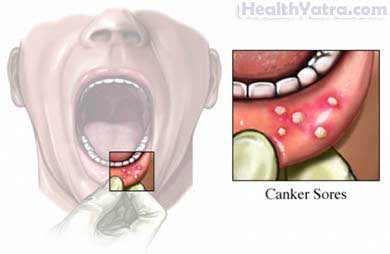Definition
Aphthous ulcers are also known as canker sores. They are painful, temporary sores that may occur anywhere in the mouth. The sores can occur one at a time or as a group. Although canker sores are not serious, other mouth sores may be. If you suspect you have this condition, make an appointment to see your doctor.

Causes
No one knows exactly what causes canker sores. They are thought to result from an overreaction of the immune system.
Canker sores are not a form of the herpes virus. Unlike herpes, canker sores cannot spread from one person to another.
Risk Factors
Canker sores tend to occur more often in women than in men. The tendency for these sores may also run in families.
The following may increase your chance of a canker sore:
- Stress or trauma in the mouth, such as biting the tongue, trauma from falls or toothbrushes
- Certain foods (especially acidic foods, such as tomatoes and pineapples)
- Changes in hormone levels
Medical conditions that may increase your chance of canker cores include:
- Deficiencies of iron, vitamin B12, or folic acid
- Bacterial infections, such as stomach ulcers caused by the bacterium, Helicobacter pylori
- Certain inflammatory bowel disorders, such as Crohn’s disease or ulcerative colitis
- Infection with the AIDS virus
- Behcet’s disease
Symptoms
Canker sores can be various sizes. They typically occur on the inner surface of the cheeks and lips, and on or under the tongue. Canker sores are an open, shallow grayish sore. It may have a slightly raised, yellowish-white border that is surrounded by a red border.
Some people get canker sores two or three times per year. Others develop sores continually one after another. Usually the most painful phase is the first 3-4 days. The sores begin to heal after 3- 4 days.
Minor sores may last for a total of 7-14 days. They often heal without scarring. Major sores can last for several weeks or even months. They may leave a scar after they heal.
Diagnosis
Your doctor will ask about your symptoms and medical history. A physical exam will be done. Your doctor will most likely be able to tell the difference between a canker sore or more serious mouth sore by looking at it. To rule out other problems your doctor may do the following:
- Biopsy —a small sample of the sore will be sent to a lab for closer examination
- Blood culture or tests—to look for signs of an infection or other systemic health conditions
It is especially important to examine mouth sores that do not heal within two weeks. They may be a sign of cancer.
Treatment
Canker sores usually heal on their own within 1-2 weeks. Treatments for these sores are not usually necessary.
If your canker sore is especially painful or is taking a long time to heal, your doctor may recommend the following:
Oral Pain Relieving Rinses or Gels
An oral rinse may be used every three hours or before meals. This provides short-term relief from pain. In addition, anti-pain oral gels can be applied directly on the sores. It may be used about four times per day to numb the area.
These products can be found in pharmacy stores. Prescriptions are not needed.
Oral Antibiotic Rinse
Your doctor may prescribe a liquid antibiotic for multiple sores. It can be used as an oral rinse four times daily for 10 days. The liquid can coat the ulcers and prevent new sores from forming. Sometimes, this treatment can cause an oral infection calledcandidiasis (thrush). Thrush can be easily treated.
Corticosteroids
Steroids may be recommended for severe outbreaks. The steroid is usually given as a liquid oral rinse. Steroids help reduce swelling in the mouth caused by severe sores.
Prevention
It is not always possible to prevent canker sores. To help reduce your chances of canker sores, take the following steps:
- Chew food carefully. This may prevent biting your tongue or cheek.
- Avoid acidic foods that may promote canker sores. Tomatoes or pineapples are two foods that may cause problems.
- Talk to your doctor about how to get enough iron, vitamin B12, or folate in your diet. Low levels of these nutrients may contribute to canker sores.
Aphthous Ulcers Treatment in India – Page Keywords:
Aphthous Ulcers Definition, Aphthous Ulcers Definition Causes, Aphthous Ulcers Symptoms, Aphthous Ulcers Treatment in India, Aphthous Ulcers Treatment Cost in India, Aphthous Ulcers Surgery Cost, Top Aphthous Ulcers Treatment Hospital, Top Aphthous Ulcers Treatment Doctor in India, Aphthous Ulcers Meaning in Marathi, Aphthous Ulcers Treatment Near me, Aphthous Ulcers Complications, Travel India for Aphthous Ulcers Treatment, Aphthous Ulcers Treatment in Arab Countries, Aphthous Ulcers Treatment in Bangladesh, Aphthous Ulcers Treatment in Dhaka, Aphthous Ulcers Meaning in Bengali, Aphthous Ulcers Meaning in Arabic, Aphthous Ulcers Meaning in Hindi, Aphthous Ulcers Treatment in Bahrain, Aphthous Ulcers Treatment in Egypt, Aphthous Ulcers Treatment in Iraq, Aphthous Ulcers Treatment in Jordan, Aphthous Ulcers Treatment in Kuwait, Aphthous Ulcers Treatment in Lebanon, Aphthous Ulcers Treatment in Saudi Arabia, Aphthous Ulcers Treatment in United Arab Emirates, Aphthous Ulcers Treatment in Sudan, Aphthous Ulcers Treatment in Tunisia, Aphthous Ulcers Treatment in Nepal, Aphthous Ulcers Treatment cost,
